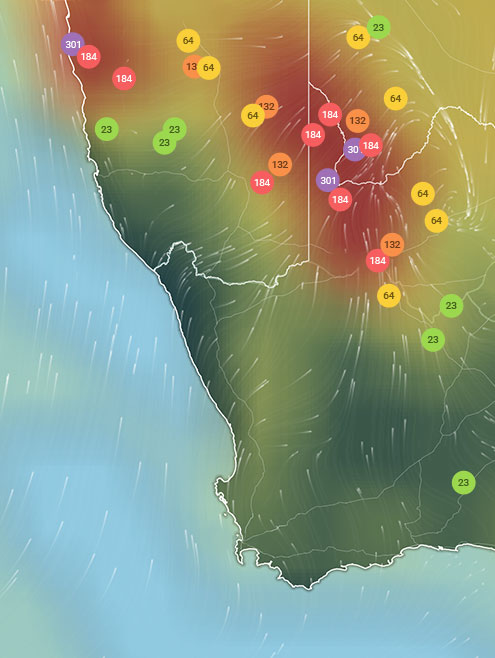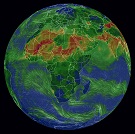Get a monitor and contributor to air quality data in your city.
59.2K people follow this city






AIR QUALITY DATA CONTRIBUTORS
Find out more about contributors and data sources| Weather | Broken clouds |
| Temperature | 53.6°F |
| Humidity | 83% |
| Wind | 5 mp/h |
| Pressure | 29.8 Hg |
| # | city | US AQI |
|---|---|---|
| 1 | Tel Aviv-Yafo, Tel Aviv | 66 |
| 2 | Kiryat Gat, Southern District | 64 |
| 3 | Jerusalem, Jerusalem | 62 |
| 4 | Holon, Central District | 61 |
| 5 | Nir Galim, Central District | 61 |
| 6 | Haifa, Haifa | 60 |
| 7 | Kiryat Malakhi, Southern District | 58 |
| 8 | Ashdod, Southern District | 55 |
(local time)
SEE WORLD AQI RANKING
| # | station | US AQI |
|---|---|---|
| 1 | Jerusalem Central Bus Station | 76 |
| 2 | Safra Square | 54 |
| 3 | Israel Aharon Fishel St | 44 |
(local time)
SEE WORLD AQI RANKINGUS AQI
62
live AQI index
Moderate
| Air pollution level | Air quality index | Main pollutant |
|---|---|---|
| Moderate | 62 US AQI | PM2.5 |
| Pollutants | Concentration | |
|---|---|---|
| PM2.5 | 17.4µg/m³ | |
| O3 | 133.8µg/m³ | |
| NO2 | 11.9µg/m³ | |
PM2.5
x3.5
PM2.5 concentration in Jerusalem is currently 3.5 times the WHO annual air quality guideline value
| Sensitive groups should reduce outdoor exercise | |
| Close your windows to avoid dirty outdoor air GET A MONITOR | |
| Sensitive groups should wear a mask outdoors GET A MASK | |
| Sensitive groups should run an air purifier GET AN AIR PURIFIER |
| Day | Pollution level | Weather | Temperature | Wind |
|---|---|---|---|---|
| Wednesday, Apr 17 | Moderate 86 AQI US | 82.4° 60.8° | ||
| Thursday, Apr 18 | Unhealthy 169 AQI US | 73.4° 59° | ||
| Friday, Apr 19 | Moderate 70 AQI US | 69.8° 53.6° | ||
| Friday, Apr 19 | Moderate 61 AQI US | 69.8° 53.6° | ||
| Today | Moderate 62 AQI US | 73.4° 51.8° | ||
| Sunday, Apr 21 | Good 48 AQI US | 68° 51.8° | ||
| Monday, Apr 22 | Good 38 AQI US | 71.6° 48.2° | ||
| Tuesday, Apr 23 | Moderate 59 AQI US | 80.6° 55.4° | ||
| Wednesday, Apr 24 | Moderate 58 AQI US | 89.6° 68° | ||
| Thursday, Apr 25 | Moderate 59 AQI US | 87.8° 69.8° | ||
| Friday, Apr 26 | Moderate 71 AQI US | 84.2° 68° |
Interested in hourly forecast? Get the app
Jerusalem is a city located in the Middle East on a high plateau in the Judean mountains. In 2019 the estimated population was 1.25 million people.
At the beginning of 2021, Jerusalem was experiencing a “Moderate” quality of air with a US AQI reading of 75. The classification follows the guidelines from the World Health Organisation (WHO). Levels of other pollutants were measured and recorded as follows: PM2.5 - 23.5 µg/m³ and nitrogen dioxide (NO2) - 35.9 µg/m³. With concentrations at this level, the given advice is to close all doors and windows to prevent the ingress of dirty air and those with a sensitive disposition are advised to avoid outdoor activity unless it is essential in which case a good quality mask should be worn.
The level of air quality did not vary much throughout the year. The 2019 average figure was 20.9 µg/m³ which classes it as “Moderate” with figures between 12.1 and 34.5 µg/m³. It is getting slightly worse when compared to previous years. 2017 saw a figure of 17.1 µg/m³ and 2018 saw 18.9 µg/m³.
Air pollution is a condition in which air contains chemicals and biological substances that are not included in its natural composition and can be harmful to human health and impair the quality of life. Air pollution is mainly caused by industrialisation and transportation known as anthropogenic pollution. Most people are loathed to leave their car at home and use public transport, citing that it is not as convenient as your own personal vehicle. Mobile monitoring stations that have been set up near busy road junctions numerically prove that air pollution near busy junctions is far higher than elsewhere. Cars that are waiting for the traffic lights to change leave their engines running on idle so their air-conditioning system can still be used. Modern motorbikes are often fitted with a device that turns off the engine once forward motion is no longer detected. However, it will be many years before all motorbikes in the city have this technology. Due to their relative simplicity, they can be repaired for many years and kept running.
According to data received from the local authorities in Jerusalem, a high concentration of air pollution was recorded in Bar Ilan, near the Shmuel Hanavi neighbourhood. The reason behind this was from the emissions from non-green buses.
The local authorities published a document, which presented the ministry's policy for switching to the purchase of municipal buses without pollution by 2025. Implementing this plan will lead to economic benefits of NIS 1.35 billion for the Israeli economy by 2034. The changeover to the use of non-polluting buses in public transport in cities will lead to a significant improvement in air quality in city centres, to reducing greenhouse gas emissions and transportation noise nuisances, to reducing oil imports and reducing long-term economic costs.
The leading technology today for pollution-free buses is electric propulsion. Electric buses are characterised by high purchase cost, but low operating and maintenance costs. Therefore, there is viability for these buses over the entire lifespan of the bus which is usually about 10 years. In the future, the price of the electric bus is expected to drop even more thanks to the reduction in the cost of battery production.
If the move is fully approved, the full changeover to public electric transportation will be completed in 2035 which is just a decade after the ban on the purchase of diesel-powered buses.
In order to improve air quality in the city centre of Jerusalem, from November 2019 the municipality banned the entry of polluting vehicles weighing over 3.5 tons which were manufactured before 2005. The program was expanded to include the entire city in 2020. Funding for the program comes from the ministry, which budgets ancillary activities to the LEZ (Low Emission Zone) project, including the introduction of electric buses into the municipal transportation system and the installation of filters on all public transportation vehicles defined as polluting vehicles.
Clean air zones already operate in hundreds of cities in Europe and even in the city of Haifa and have proven to be effective in improving the air quality and thus the quality of life of the city's residents. The updated plan will also apply the traffic restrictions to light-polluting diesel vehicles (except for private vehicles), in accordance with the provisions of the new regulations under the Clean Air Law. Gasoline vehicles will not be affected by the plan, at this present time.
Jerusalem joins Haifa and will be the second city in Israel in which the entry of polluting diesel vehicles in all areas will be prohibited. Air pollution from transportation is one of the significant causes of death in Israel, and reducing emissions of polluting vehicles will lead to a significant reduction in air pollution in the city.
Suspended particulate matter such as PM2.5 and PM10 are produced from many sources both by human activity and nature. The main source, though is through the combustion of fossil fuels from both vehicles and power plants, as well as the domestic burning of organic matter. Generally speaking, these microscopic particles are very complex and can be a complex mixture of solid and gaseous organic and inorganic compounds.
Suspended particles can be defined according to their aerodynamic diameters, such as PM10 (particles with an aerodynamic diameter less than 10 microns) or PM2.5 (aerodynamic diameter less than 2.5 microns). The latter is the more dangerous of the two because of their size. Being microscopic, they have the ability to bypass the body’s defence system and get deep inside the lungs as far as the bronchial tubes and into the alveoli. It is here that they can pass into the bloodstream and eventually get as far as the heart, where they can cause great damage.
Different groups of people will be affected in different ways depending on their circumstances, but the most vulnerable are those with pre-existing medical conditions, pregnant women, children under the age of 14 years, senior citizens and those who need to work outside.
1Contributor
Government Contributor

3 stations
1 Data source